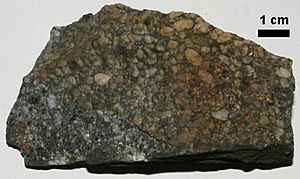Foreknobs Formation facts for kids
Quick facts for kids Foreknobs FormationStratigraphic range: Frasnian - Famennian |
|
|---|---|

Conglomerate from Foreknobs Formation, Rt. 994, near western side of bridge going over Raystown Lake, Huntingdon County, Pennsylvania
|
|
| Type | sedimentary |
| Unit of | Greenland Gap Group |
| Sub-units | Mallow Member, Briery Gap Sandstone Member, Blizzard Member, Pound Sandstone Member, and Red Lick Member |
| Underlies | Catskill Formation, or Hampshire Formation in VA |
| Overlies | Scherr Formation, or Brallier Formation in VA |
| Thickness | 1321 ft at type section |
| Lithology | |
| Primary | Siltstone, sandstone, shale |
| Other | Conglomerate |
| Location | |
| Region | Appalachian Mountains |
| Extent | Pennsylvania, Maryland, Virginia, West Virginia |
| Type section | |
| Named for | Fore Knobs of Allegheny Front |
| Named by | J. M. Dennison, 1970 |
The Foreknobs Formation is a special type of rock layer. It was formed during the Devonian Period, a very long time ago. You can find this rock unit in several states, including Pennsylvania, Maryland, Virginia, and West Virginia. Geologists study these rock layers to learn about Earth's past.
Contents
What is the Foreknobs Formation?
The Foreknobs Formation is made up of different kinds of rocks. You'll find thick layers of sandstone and siltstone. There are also "redbeds," which are brownish-gray rocks like sandstone, siltstone, and shale. These redbeds get their color from tiny bits of iron. Sometimes, you might even see conglomerate, which is a rock made of pebbles cemented together.
How Geologists Study Rock Layers
Geologists give names to different rock layers to help them understand Earth's history. The Foreknobs Formation is part of a larger group of rocks called the Greenland Gap Group. It sits above another rock layer called the Scherr Formation and below the Catskill Formation.
The Foreknobs Formation itself is divided into smaller parts called "Members." These are like chapters in a book, each with slightly different rock types. The Members are:
- Mallow Member
- Briery Gap Sandstone Member
- Blizzard Member
- Pound Sandstone Member
- Red Lick Member
Ancient Life in the Rocks

Scientists have found interesting clues about ancient life in the Foreknobs Formation. The redbeds, for example, contain scattered fossils of sea creatures. One common fossil found here is the brachiopod. Brachiopods were shelled animals that lived in the ocean. Finding these fossils helps us know what the environment was like when these rocks were forming.
Where to See the Foreknobs Formation
One important place to see the Foreknobs Formation is called its "type section." This is a specific spot where the rock layer was first described by geologists. The type section for the Foreknobs Formation is along West Virginia Highway 42, near Scherr, in Grant County, West Virginia.
When Did the Foreknobs Formation Form?
Scientists use special methods to figure out the age of rocks. These methods show that the Foreknobs Formation was created during the Late Devonian Period. This means it's incredibly old, dating back hundreds of millions of years!
 | William L. Dawson |
 | W. E. B. Du Bois |
 | Harry Belafonte |

